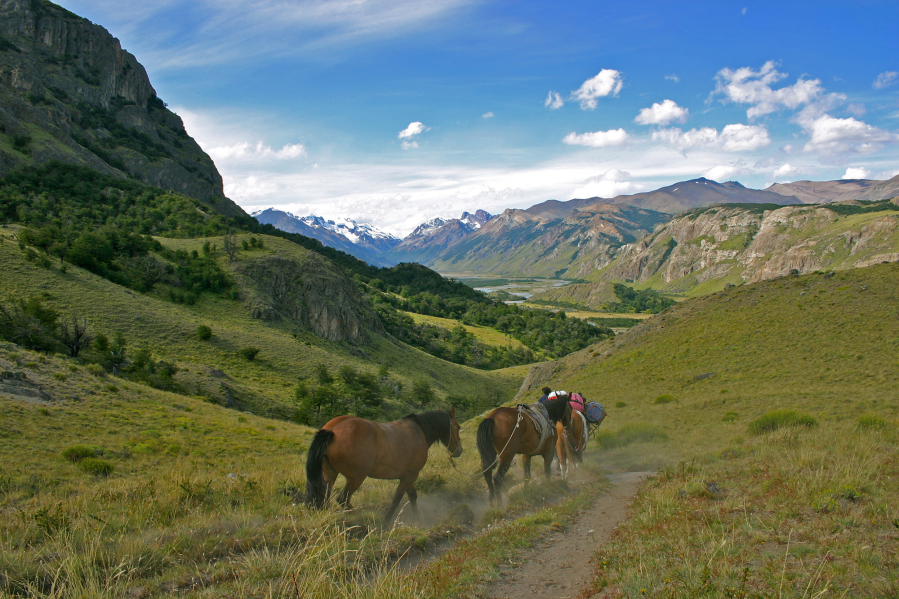BEND, Ore. — Deep in the rugged, mountainous Patagonia region of Argentina, Bend’s Mackenzie Stabler quickly realized that the Gaucho Derby was more about horsemanship than anything else.
While navigating untamed terrain and negotiating impossibly steep cliffs was crucial, the relationship with her horses was what truly mattered in the 10-day, 310-mile horseback race among the glaciers, fjords and snow-capped peaks of Patagonia.
“I thought it would be more of a navigational/survival race, but I quickly learned that horsemanship was the most important,” Stabler said. “You had to catch the horse, get it to accept all this strange gear, then get it to go ride the most technical terrain you’ve ever seen — steep cliffs, climbing out of ravines, crossing rivers.”
Stabler and her racing partner Carmen Jackson, of San Francisco, finished 15th out of 35 riders who started the Gaucho Derby, which took place March 3-12. Six riders left the race due to injury.
The event was held in 10 stages of about 25 miles each, and the riders were allowed to race from 8 a.m. to 6 p.m. each day before setting up camp. Racers rode a series of horses, all of which were vetted and changed along the way, ensuring that horse welfare was a priority over winning, according to Stabler. Strict regulations guaranteed the safety of the horses, including penalties for riding too fast over difficult terrain. Rescue and medical teams were at the ready to assist in case of emergencies.
The director of operations at Humm Kombucha in Bend, Stabler, 37, learned about the Gaucho Derby through a friend. She researched the event online and knew immediately she wanted to do it.
Stabler made it through three interviews and was one of 35 riders selected out of about 600 applicants. Then she spent two years training and preparing for the race.
“I did a ton of training in high-altitude and winter-camping conditions,” Stabler said. “So I felt really confident. I spent a ton of time traversing from Sisters to up and over Broken Top, Tam McArthur Rim, dropping to Todd Lake and going over to Cultus Lake. I went back and forth. I did it four times this summer. I also did a really long navigational training ride in the Ochocos.”
Stabler has been riding horses since she was 5 and has lived in Bend for 14 years. She has held jobs across the board in the equestrian world, from being a guide at Black Butte Stables, to working as a groom for an international show jumping barn, to managing boarding facilities.
Then she realized she loved wandering around the Cascades with a pack of horses and gear to explore the woods.
Stabler was prepared for the Gaucho Derby, but the terrain of Patagonia was incomparable to the Pacific Northwest.
“The amount of up-and-down is incredible,” Stabler said. “These horses live in these mountains and spend their days going up and down 2,000 feet. There’s more climbing than I could have ever imagined. We averaged 4,500 to 5,500 feet of climbing per day. As much as you went up, you also went down.”
The race was all point-to-point via GPS. Riders had to find their own route and there were no set trails.
“Very mountainous, super steep and rocky,” Stabler said. “You don’t see any sign of other people. You don’t pass through campgrounds or roads.”
Stabler rode seven different horses throughout the derby. She described them as “very capable, but not push-button by any means.” The gaucho horses are the local working horses of southern Argentina.
“They are athletes beyond any horses I’ve seen,” Stabler said. “I’ve never ridden horses this magnificent in my entire life. You had to take good care of your horse or you got heavily penalized. Some people got bucked off and injured. Not because the horses are ill-behaved, but you have to know what you’re doing and not take the horses or the riding for granted.”
Stabler packed all her own food and drank from rivers and streams along the route. Racers were supposed to be self-supported, but occasionally food was available at horse stations where they changed horses along the way.
The Gaucho Derby offered Stabler a chance to test her limits as an equestrienne, but also to give back to the Central Oregon community. She used the race as a pledge fundraising campaign for Camp Fire Central Oregon, a Bend nonprofit dedicated to youth development. Stabler said she raised $5,500 that will go toward scholarships for kids to attend camps and programs.
Her experience in Patagonia provided incredible memories, but Stabler will soon be back roaming the Central Oregon Cascades with her horses.
“I can’t get enough of it,” Stabler said. “Horses are what I return to to find pieces of myself … Just incredibly humbling and intriguing to me. They are amazing teachers. They teach you a lot about yourself. I understand them really well, and they give me insight on how to connect with people and the rest of the world.”



